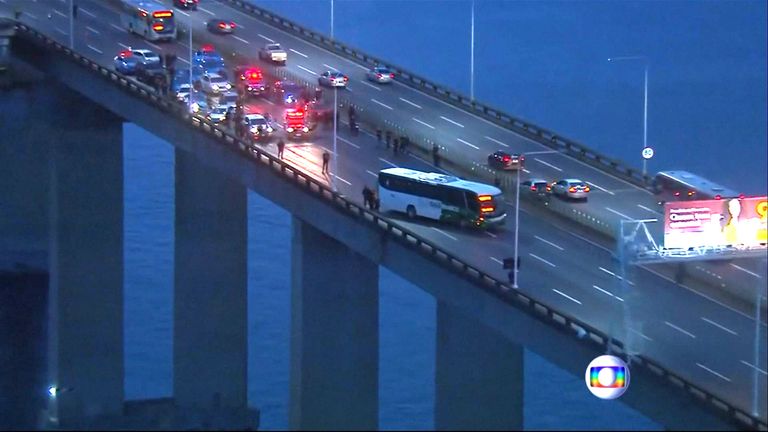Rio bus hijacking: Hostages released after police sniper shoots hijacker dead
Some of the released hostages said the man had poured petrol in the bus and threatened to set it alight.
A police sniper in Rio de Janeiro has shot dead an armed man who took dozens of people hostage on a bus, according to officials.
The man, who reportedly identified himself as a policeman, took 37 people hostage on a bus that was travelling across a busy bridge connecting the suburb of Sao Goncalo to central Rio on Tuesday morning.
Several hostages who were released during negotiations recalled how the man had poured petrol in the vehicle and had threatened to set it alight.
After a four-hour standoff and negotiation, in which police say the hijacker made no specific demands, Brazil's elite police force BOPE said its sniper had "neutralised" him.
It added that all the hostages were released unharmed.
In a press conference, Rio's governor Wilson Witzel confirmed the hostage taker had been killed.
He added in a tweet: "Ideally, everyone should leave the operation alive, but we prefer to save the hostages.
"I have determined that the Victimisation Secretary takes care of the hostages and also the abductor's family."
A spokesperson for the traffic police earlier told Brazil's TV Globo that the man appeared to have "psychological problems", while one of the hostages, Hans Moreno, later told the same broadcaster that the hijacker was "very calm" through the ordeal.
Footage posted to social media is said to show the moment the sniper shoots the hijacker.
In the video, a masked man is seen throwing an object as he steps off the bus. As he turns to get back on, he is seen to fall to his knees.
Meanwhile, the wife of one of the hostages told Good Morning Rio that her husband had texted her when the bus was being hijacked.
She said: "He left for work at 4.30am. When it was around 5.26am he texted me saying that the bus was being hijacked - 'we're going to the bridge'.
"At first I thought it was a robbery. I got up, woke up my son and said, 'your father is being robbed'."
Hundreds of vehicles were backed up on the bridge during the incident, with the road being forced to close in both directions.
Many people living in Sao Gonçalo cross the bridge each morning to commute to work in central Rio.
The man, who reportedly identified himself as a policeman, took 37 people hostage on a bus that was travelling across a busy bridge connecting the suburb of Sao Goncalo to central Rio on Tuesday morning.
Several hostages who were released during negotiations recalled how the man had poured petrol in the vehicle and had threatened to set it alight.
After a four-hour standoff and negotiation, in which police say the hijacker made no specific demands, Brazil's elite police force BOPE said its sniper had "neutralised" him.
It added that all the hostages were released unharmed.
In a press conference, Rio's governor Wilson Witzel confirmed the hostage taker had been killed.
"I have determined that the Victimisation Secretary takes care of the hostages and also the abductor's family."
A spokesperson for the traffic police earlier told Brazil's TV Globo that the man appeared to have "psychological problems", while one of the hostages, Hans Moreno, later told the same broadcaster that the hijacker was "very calm" through the ordeal.
Footage posted to social media is said to show the moment the sniper shoots the hijacker.
In the video, a masked man is seen throwing an object as he steps off the bus. As he turns to get back on, he is seen to fall to his knees.
Meanwhile, the wife of one of the hostages told Good Morning Rio that her husband had texted her when the bus was being hijacked.
She said: "He left for work at 4.30am. When it was around 5.26am he texted me saying that the bus was being hijacked - 'we're going to the bridge'.
"At first I thought it was a robbery. I got up, woke up my son and said, 'your father is being robbed'."
Hundreds of vehicles were backed up on the bridge during the incident, with the road being forced to close in both directions.
Many people living in Sao Gonçalo cross the bridge each morning to commute to work in central Rio.



